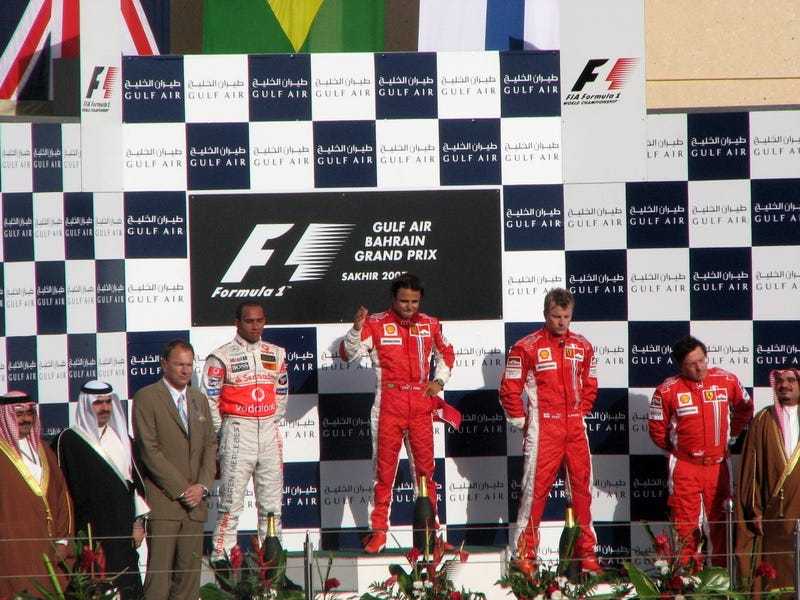Formula One isn’t driving change. It’s driving authoritarian ambitions
Following a season-opener in Bahrain and a follow-up grand prix in Saudi Arabia, Formula One continues to be a useful tool for authoritarian sportswashing.
On Sunday, March 19—just over a year after Saudi Arabia executed 81 men in a single day for taking part in anti-government protests—Formula One returned to the Red Sea port city of Jeddah for the annual Saudi Arabian Grand Prix.
The race marked F1’s second event in 2023 following the organization’s season-opener in the Kingdom of Bahrain and saw Red Bull’s Mexican star Sergio Pérez triumph over teammate Max Verstappen at the Jeddah Corniche Circuit. And though the event drew the usual fanfare and excitement expected from an F1 showcase, it also led to fresh accusations of sportswashing from critics.
Last week, Yasser al-Khayyat—the brother of one of the 81 men who were executed in a single day by Saudi authorities—sent a letter to F1 CEO Stefano Domenicali arguing that the organization is helping legitimize the Kingdom’s “heinous crimes.” He also asserted that his brother had been executed for simply taking part in pro-democracy protests.
“They use the spectacle of this sporting championship to distract from the murder of my brother and hundreds of others,” al-Khayyat wrote. “The grand prix carrying on as normal, without even mentioning the atrocities that have just been committed on that same soil, legitimizes these heinous crimes.
“Silence is complicity. It is how the regime gets away with its atrocities and suppresses calls for democratic reforms. If you truly want Formula One to be an agent for change, rather than a tool to ‘sportswash’ Saudi abuses, please end Formula One’s silence.”
Al-Khayyat felt compelled to write his letter after Domenicali argued in a recent interview with The Guardian that F1 was capable of exacting positive change and reform through the organization’s partnerships with controversial regimes such as Bahrain, Saudi Arabia and Qatar.
“I have the duty of running a sport that is more than a sport today,” Domenicali said in his interview with Guardian journalist Giles Richard. “I need to keep the sport in the sport dimension but I also feel that due to the relationships I have and the network we are creating in the world it can adapt to become a positive.”
Domenicali’s argument that sports organizations can use “soft power” to engender positive change in authoritarian regimes is a tired and disingenuous statement that holds no basis in reality. Of the countless entities that have partnered with Saudi Arabia over the past few years, none have been able to coerce any substantive change or reform within the kingdom, as is evidenced by Saudi’s continued oppression. There is also no proof that F1 has ever seriously engaged with human rights in the kingdom.
The F1 CEO’s argument even failed to convince one of his own drivers, Lewis Hamilton, who expressed concerns ahead of this past weekend’s race.
“I still feel that as a sport going to places with human rights issues, such as this one, I feel that the sport is duty bound to raise awareness and try to leave a positive impact,” Hamilton said during the press conference. “And I feel like it needs to do more. What that is, I don’t have all the answers, but I think we always need to try and do more to raise awareness for things that the people are struggling with.”
As authoritarian regimes continue to utilize sports for political gain, F1 has proven to be among the biggest offenders of sportswashing. The 2023 schedule includes events in Bahrain, Saudi Arabia, the United Arab Emirates, Azerbaijan and Qatar, all of whom have been accused of widespread human rights abuses. The organization will also host a race in Hungary, where a quasi-fascist government is currently dismantling the rule of law and democratic institutions while also targeting women’s rights and the country’s LGBTQ+ community.
However, F1’s partnerships with questionable regimes has not gone unopposed.
In October 2022, the Bahrain Institute for Rights and Democracy (Bird) served F1 with a legal complaint accusing it of breaching Organization for Economic Co-operation and Development guidelines after the sport concluded a deal this year extending its contract to hold races in Bahrain until 2036. The complaint alleged that F1 ailed to engage with human rights stakeholders including human rights organizations, legislators from across Europe, victims impacted by the Formula One race and those who have faced reprisals for their human rights work.”
Nevertheless, it appears there is little stopping F1 from embracing sportswashing in its pursuit for profit. While the organization has long claimed it is a driver of change, it appears to be little more than a pathway for authoritarian ambitions.




As a diehard F1 fan that routinely goes to the US GPs, it's been beyond frustrating seeing them do the exact same thing boxing, wrestling and the UFC are doing...allowing their promotions to be used nefariously to sweep human rights atrocities under the rug.
Side Note: Love the new blog, Karim. Happy to support your wonderful work!
What can we do as fans? I find myself in a similar mindset with the UFC, i love the sport aspect of both but i can't ignore stuff like this.